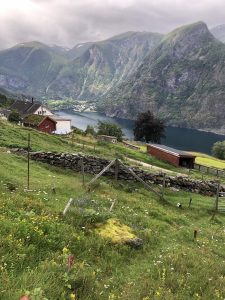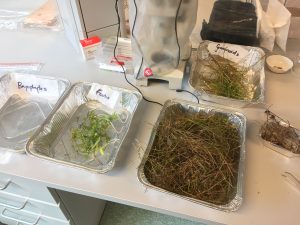Alpine grasslands harbour a vast biodiversity and contribute to the terrestrial carbon store. Climate change is predicted to cause shifts in plant community composition in alpine environments. These shifts are likely to also change the functioning of the belowground system and affect soil organisms as well as the interactions between the aboveground and belowground components of the ecosystem. We need to understand the effect of changed climate in order to protect the alpine grassland systems.
 Project description
Project description
In the FUNDER project, we aim to disentangle direct and indirect effects of climate on the plant-soil food web. To do that, we need to understand how plants interact and whether the interactions are affected by climate. We have, therefore, done a plant functional group (PFG) removal experiment where bryophytes, graminoids and forbs have been removed from our experimental plots in all possible combinations. One fundamental question that could be answered by this experimental approach is whether the remaining vegetation is able to compensate for the biomass that has been removed. By investigating how the total biomass is affected by PFG removal, we could see whether interactions between PFGs are facilitative or competitive.
Tasks
We are looking for one or more students to help with lab work. The task is to sort the vegetation into functional groups (bryophytes, forbs, graminoids), drying the sorted vegetation and weighing it.

Starting date/period: November 20th 2022
The project involves: Labwork
Experience
By participating in the project, you will get experience in some relevant lab procedures in plant ecology and practice in how to document and manage scientific data. You will also learn how to identify plant functional groups.
Involvement: Flexible, but maximum 40 h per student.
Interested by this project? Need more info? Contact Karolina Jörgensen (karolina.jorgensen@gmail.com)
Project number: 043
